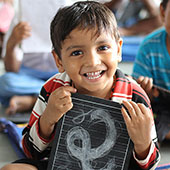Home / Courses / Designing for Children - Play and Learn / Learning Theories and Design / Vygotsky’s Socio-cultural Theory of Development
Design Course
Designing for Children - Play and Learn
Play and Learn
by
Lev Vygotsky was among the pioneers to highlight the effect of society and culture on the development of children, and gave a complementary view to Piaget’s framework, becoming a basis for much of the later work in education. Some important aspects of Vygotsky’s theory are briefly described below along with some design recommendations.
• Social artefacts like language and signs play an important role in the cognitive development, and it is through speech, that children learn to plan actions.
• Appropriate social supports and external tools can have a significant effect on aiding learning and augmenting cognition in children. Also, context is an important part of learning so learning applications need to ensure that knowledge is situated in a context for easier understanding and retention.
When children can complete a task with help (scaffolding) but cannot complete it on their own, they are in the zone of proximal development. Focus of design should be on keeping the learning goal in this zone, to maximize gains.

